PIOTR BELEVICH, RIGHTEOUS AMONG THE NATIONS and the Zimmers of Sharkovishna whom he saved
from http://shtetle.co.il/Shtetls/sharkovshina/belevich_eng.html
Piotr Ivanovich Belevich was born in the village Rubezh on June 28th, 1922. In the 30s his family moved to a place called Lapushino several kilometers away from Vasuki, which from 1921 to 1939 belonged to Poland.
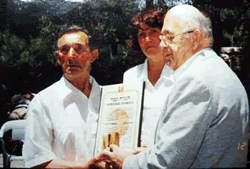
Award ceremony, Piotr Belevich.
From 1935 the family was on friendly terms with the Zimmers from Sharkovshina. They also had business relations. At that time the Zimmers had their own restaurant, which the Belevichs supplied food to (agricultural products grown from their household).
Piotr Belevich studied at a school in Sharkovshina and frequented the Zimmers’ house. The Zimmers had eight children, who the boy was friendly with, especially the elder children – Tsilia, Grisha and Zalman.
In the summer of 1941 Sharkovshina region was occupied by Germans. Soon the fascists opened a ghetto, where Jews from all neighboring were brought. The Zimmers turned out in the ghetto as well.
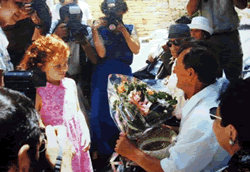
Tsilia Zimmer’s granddaughter.
Tsilia Zimmer and her younger sister Slava were in the Glubokoye ghetto. After finding out about it, Piotr Belevich bought the girls out and they stayed with the Belevichs. Some time later the girls’ parents decided to take Slava to the ghetto where they stayed in Postavy, while the blond Tsilia Zimmer, who did not look Jewish, remained with the Belevichs. They said she was a distant relative from another village.
The mass executions of Jews began in the autumn of 1941.
Several months later, on a winter night, while coming back from partisans, Piotr Belevich found an almost lifeless wounded Slava Zimmer by the river Golbeitsa. The girl was barefooted, dressed in rags, with blisters covering her whole body. He took her to their bathhouse, cleaned her wounds, covered her skin with grease and wrapped into warm sheets. He took care of her secretly from everyone else. Only when he realized that Slava was going to survive, he told her sister Tsilia about it. That was when Tsilia found out that their mother had perished with all the other Jewish residents of the ghetto in Postavy.
Slava Zimmer remembered that before the execution, while they were being taken to the ditch, her mother did not talk about death. She repeated several times that as soon as the Germans left, the girl had to climb out of the ditch and head for Lapushino to look for Piotr Belevich. Then she pressed the girl against her chest. Slava did not remember what happened afterwards. When she regained consciousness, she did not feel any pain and did not realize she was wounded. She saw bleeding people, some of them still alive, moaning next to her. Some of them tried to crawl out of the ditch. Slava got out of her mother’s arms, which were still clasping her, and crawled out. She barely remembered how she reached the river.
When Slava recovered, Piotr thought it was safer for her to live in their barn. Sometimes she was brought to the house, when there were suspicions that people, working on the farmstead, could find out about her. As it turned out later, Slava was the only child that survived in the ghetto in Postavy.
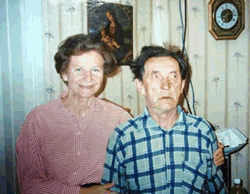
Meeting of P. Belevich and Slava Zimmer in Vasuki.
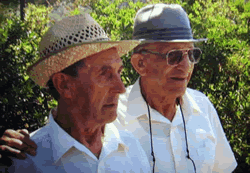
Piotr Belevich and Zalman Zimmer.
The Germans searched the farmstead several times. Once, when they came, both Slava and Tsilia were in the house. The blond Tsilia was smiling to the Nazis while Slava was being hidden. Fortunately, the Nazis did not notice her. Another time, when the house was being searched, Piotr took Slava out of the house in a big basket, pretending he was going to feed the cows.
In the spring of 1943 some of the neighbors started suspecting that Tsilia was Jewish and so she had to hide in the barn together with Slava.
In the autumn of 1943 the situation became even more dangerous. During the third search Tsilia and Slava were sitting in the barn and suddenly heard the animals roaring. They decided that the Nazis had set the farmstead on fire. The girls had guns and they had previously agreed that in case of being discovered they would shoot each other. They were ready to do it when they heard Piotr shouting that the Germans had left. So they survived. Later the two brothers, Grigory and Zalman Zimmer, who had escaped from their ghetto, also hid in that barn.
Soon after that Piotr Belevich took Tsilia and Slava and joined a partisan detachment, where other Jews were hiding from the Nazis.
After the liberation in 1944 Piotr Belevich found out that Tsilia, Slava, Grigory and Zalman Zimmer survived and moved to live abroad.
Tsilia Zimmer, who lived in the US, was looking for Piotr all her life. She found out about the tragic death of another Piotr Belevich, whom she mistakenly took as the person she knew. She was not aware, that the Piotr she was looking for, was still alive.
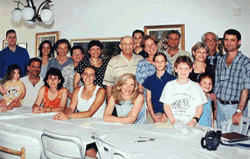
Children, grandchildren of Slava, Tsilia and Zalman Zimmer.
At that time Tsilia was gravely ill and she was unable to come back to her birthplace. She asked her son, Samuel Kassov, who was a history professor and frequently came to Moscow, to find Piotr’s grave and bring her some land from it. In 1992 Samuel arrived in Sharkovshina and started asking the local people about Piotr. To his luck, he met a woman, who told him that Piotr’s family lived in Vasuki. Sam let his mother know the good news that Piotr was alive.
And only then Sam Kassov met Piotr Belevich, who had saved his mother and aunt in the war. Sam showed some recent photographs of Tsilia and Slava to Piotr and related about their life in America. Piotr immediately recognized the sisters in the photo and was happy to find out that they were alive and had their own families.
So the communication began. It started with letters, telephone calls and then Tsilia’s children and Slava with her family (from the US), Zalman and Grigory’s wife Rosa (from Israel) came to visit Piotr Belevich.
On October 22nd, 1998, Piotr Beleveich was instated the Righteous among the Nations.
Material based on the story told by Piotr Ivanovich Belevich and his daughter Alina Petrovna Strui, 2008
10th grade students of Vasuki school, Sharkovshina region, teacher T.M. Klimza
The research participated in the 2nd Republican contest “Holocaust. History and present time. Tolerance lessons.”
The research original is in archive of the Museum of history and culture of Belarusian